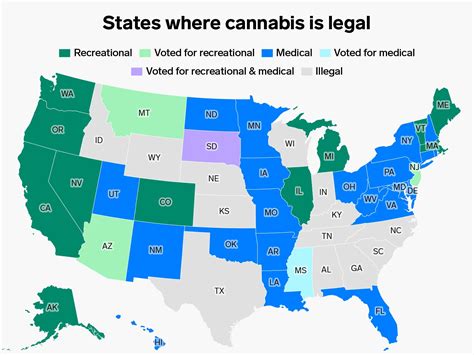In the United States, marijuana is classified as a Schedule I substance under the Controlled Substances Act, which signifies that it is considered to have a high potential for dependency and no accepted medical use, necessitating strict control and supervision. Nonetheless, a divergence exists between federal and state policies. While the substance remains federally illegal for all purposes, numerous states have enacted laws to allow its use for medicinal purposes, which is regulated by the U.S. Food and Drug Administration.
As of March 1, 2023, a notable policy shift has occurred, with 21 states, along with Washington D.C., Guam, and the Northern Mariana Islands, legalizing the recreational use of marijuana. These laws eliminate state-imposed penalties for specified activities related to the substance. However, despite these changes, federal and state regulations continue to enforce significant restrictions on trafficking, marketing, and sales to minors to mitigate potential social and health consequences.
Marijuana’s prevalence in the United States is significant, with about 18% of Americans reported having used it at least once in 2019. Research indicates that roughly 30% of marijuana users may develop a use disorder, particularly among those who begin using the substance before the age of 18.
The legal landscape for medicinal cannabis is complex. Although illegal at the federal level, 47 states, three U.S. territories, and the District of Columbia have legalized medicinal cannabis in some form. This has led to an estimated three million Americans using cannabis for relief from various illnesses, a number expected to increase due to ongoing policy changes.
Marijuana, also known as cannabis, weed, pot, or dope, is a complex plant comprising over 100 compounds, including the psychoactive THC and the non-impairing CBD. The ways in which marijuana can be consumed are diverse, including smoking, as in joints or blunts, and ingestion via edibles or infused drinks.
The Centers for Disease Control and Prevention (CDC) is actively working to understand the public health implications of marijuana use and address related health concerns. Moreover, the organization provides data and statistics to inform the public and policymakers.
For more detailed information on marijuana policy, readers can refer to various resources:
Drug Fact Sheet: Marijuana/Cannabis – DEA.gov,
The Federal Status of Marijuana,
Statement from President Biden on Marijuana Reform,
Data and Statistics – CDC, and
Medicinal Cannabis: Policy, Patients, and Providers – PMC.
